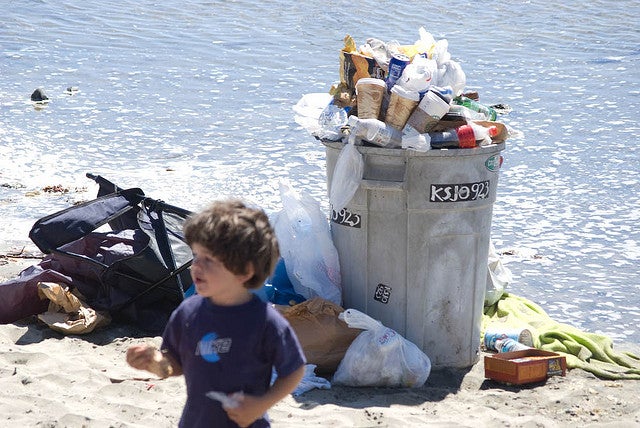Garbage on the beach: a daily problem

An overflowing garbage can near the water. (Photo: MartinStein via Flickr)
The garbage that you see on the beach during the afternoon and not the morning? There’s a reason for that, says a Rutgers University researcher.
Beach maintenance varies from town to town, but one common daily problem is overflowing garbage cans, and Gregg Sakowicz, also known as “Professor Sak” on Facebook, explains why and offers solutions.
Sakowicz conducts research at the university in conjunction with a partnership with the Jacques Cousteau National Estuarine Research Reserve (JCNERR) and is a regular blogger.
His credentials as a coastal scientist are bolstered by his residency in Lavallette, a barrier island community situated between Point Pleasant Beach and Seaside Heights.
The reason
Sakowicz says that there is misconception that trash on the beaches comes from New York City or an offshore garbage barge.
But the explanation is rooted in basic meteorology and biology, according to a recent blog post published by Sakowicz:
“It is a familiar pattern: light offshore (West) winds in the morning give way to a warm-weather-induced shift to onshore (typically S-SSE) later in the morning or early afternoon, which in turn gives way to offshore winds once again in the evening. Unfortunately the late-day arrival of offshore winds coincides with over-filled trash cans spilling their contents onto the beach; these winds often carry light trash such as plastic bags and Styrofoam cups and deposit them into the ocean. Seagulls also disturb the contents of the can, spilling refuse onto the sand, and often drag anything edible down to the water as they attempt to fend off competitors.”
The solution
Sakowicz notes that since municipalities generate revenue from the beach, courtesy of badge sales and local tourism, they should bear responsibility for keeping their asset in shape.
However, doing so requires upkeep and modifications that may appear simple but come at an extra cost, which he notes as unfortunate.
Beachgoers should also bear some responsibility, he writes, but “most beach patrons are vacationers who often don’t possess the same sense of awareness of the ramifications of their actions, nor as strong a sense of custodianship, as full-time residents,” the researcher laments.
Regardless of the cost of regular upkeep, Sakowicz writes that it is “inexcusable” for municipalities to collect beach revenue while not controlling the daily trash problem.
“To shirk this obligation results in abusive exploitation, rather than well-intended utilization, of the resource.”
WHYY is your source for fact-based, in-depth journalism and information. As a nonprofit organization, we rely on financial support from readers like you. Please give today.

